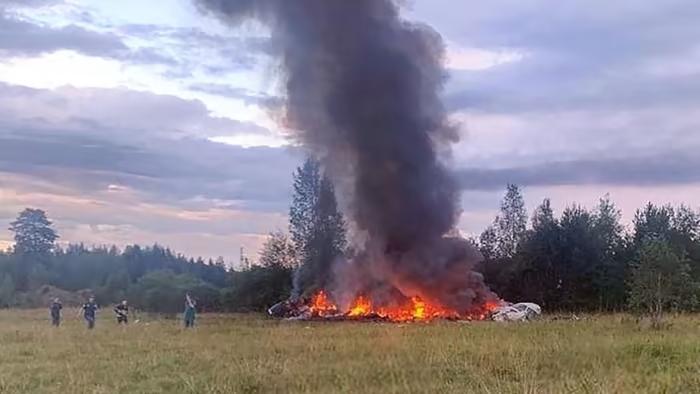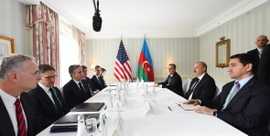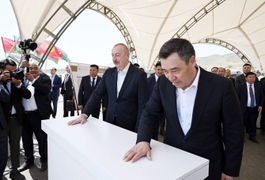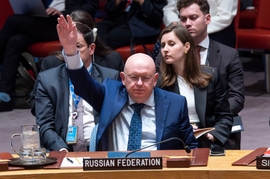Wagner Group leader Yevgeny Prigozhin, who staged a brief mutiny against Russia’s leadership earlier this year, is believed to have died in a plane crash on August 23.
According to a statement by the press service of Russia's Federal Air Transport Agency, Prigozhin was on the passenger list of a plane that crashed in Russia's Tver region on Wednesday. Ten people died in the crash, the agency said.
Prigozhin played one of key roles in what Russia calls a “special military operation” in Ukraine, before launching a short-lived insurrection against both the Russian military and President Vladimir Putin.
Seven passengers and three crew were on board the Embraer aircraft and were all killed in the crash, TASS reported. The plane was flying from Moscow to St. Petersburg.
Crewmembers on-board were pilot-in-command Alexey Levshin, co-pilot Rustam Karimov and flight attendant Kristina Raspopova.
“The flight of the Embraer-135 jet (EBM-135BJ) was performed in accordance with a flight permit issued in due order,” TASS quoted the agency as saying.
An investigation was launched into the crash. Wagner Group co-founder Dmitriy Utkin is also presumed to have died in the crash.
Prigozhin, a close ally of President Putin, was a co-founder of the Wagner Group in 2014, alongside Russian military officer Dmitriy Utkin, following Russia's intervention in Crimea during the Russian-Ukrainian conflict.
Although Prigozhin long denied any involvement in the Wagner Group, he publicly confirmed his role in late 2022, several months into Russia's intervention in Ukraine. According to the White House estimates, approximately 50,000 fighters from the Wagner Group, mostly recruited from Russian prisons, participated in the conflict.
Prigozhin grew famous for criticizing Russia’s military hierarchy, accusing them of inflicting significant casualties on his mercenary forces in Ukraine.
Tensions escalated in late June when Wagner troops, led by Prigozhin, seized control of key military facilities in Rostov-on-Don and Voronezh, two cities located near the Ukrainian border. Prigozhin demanded an audience with Russia’s Defense Minister and top general, threatening to blockade Rostov and advance towards Moscow if his demands were not met.
Videos on social media depicted Wagner Group soldiers strategically positioning themselves in Rostov’s streets, while authorities in Voronezh reported the movement of a military convoy along a major highway. The strategic importance of Rostov and Voronezh, due to their proximity to Ukraine’s Donbas region and position on a primary route to Moscow, added gravity to the situation.
In a televised address, President Putin responded by declaring the actions taken by Prigozhin as a "stab in the back."
Wagner’s march came to a halt when Prigozhin abruptly announced that his mercenaries would return to their base camps, citing a desire to prevent Russian bloodshed.
In a surprising twist, the Kremlin announced that Prigozhin were to leave Russia for Belarus, putting an end to an armed insurrection that posed a significant threat to the ruling authority. The deal, reportedly facilitated by Belarusian President Alexander Lukashenko, ensured Prigozhin’s immunity from prosecution and mandated his relocation to Belarus in the near future.
Prigozhin, in turn, said he had never intended a "coup" against Putin and had merely been seeking "justice" for his Wagner soldiers in their conflict with Shoigu and Russia's military leadership.
In the aftermath of the insurrection attempt, Prigozhin withdrew from the public eye. While reports indicated the dissolution of his media empire, he remained in Russia and was seen at a summit in St. Petersburg attended by African leaders and President Putin. Some members of the Wagner Group relocated to a camp established in Belarus.
Recent reports have linked Prigozhin and the Wagner Group to the military coup in Niger, where Prigozhin reportedly extended Wagner's support to the junta.







 President Ilham Aliyev shed light on the evolving contours of the peace process with Armenia during an international conference in Baku this week. ...
President Ilham Aliyev shed light on the evolving contours of the peace process with Armenia during an international conference in Baku this week. ...
 Iranian President Ebrahim Raisi expressed Tehran’s readiness to participate in significant development projects in Sri Lanka during the inauguratio...
Iranian President Ebrahim Raisi expressed Tehran’s readiness to participate in significant development projects in Sri Lanka during the inauguratio...
 Turkmen President Serdar Berdimuhamedow and British Secretary of State for Foreign Affairs, Commonwealth Affairs, and Development David Cameron dis...
Turkmen President Serdar Berdimuhamedow and British Secretary of State for Foreign Affairs, Commonwealth Affairs, and Development David Cameron dis...



